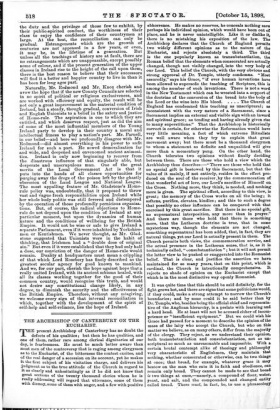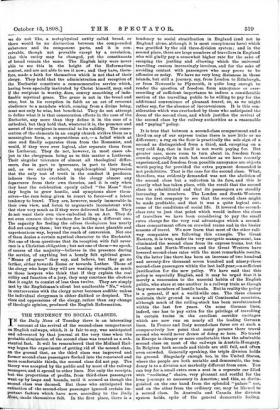THE ARCHBISHOP OF CANTERBURY ON THE EUCHARIST. T HE present Archbishop
of Canterbury has no doubt the defects of his qualities ; but then he has qualities, and one of them, rather rare among clerical dignitaries of our day, is fearlessness. He must be much better aware than most men of the controversy that is raging among clergymen as to the Euchariat, of the bitterness the contest excites, and of the real danger of a secession on its account, yet he makes it the first subject of his visitation charge, and delivers his judgment as to the true attitude of the Church in regard to it as clearly and unhesitatingly as if he did not know that great sections of the twenty thousand clerics whom be is reall. y addressing will regard that utterance, some of them with dismay, some of them with anger, and a few with positive abhorrence. He makes no reserves, he conceals nothing save perhaps his individual opinion, which would have been out of place, and he is never unintelligible. Like it or dislike it, there is no mistaking his exposition of the law. The Archbishop declares that the Church of England permits two widely different opinions as to the nature of the Eucharist, and rejects absolutely a third. The third is the one popularly known as transubstantiation, the Roman belief that the elements when consecrated are actually changed, though not visibly changed, into the very body of our Lord. This belief the Church, with the very obvious and strong approval of Dr. Temple, utterly condemns. "Most assuredly," says his Grace, "if ever human inventions have been allowed to supersede the teaching of Scripture, this is among the number of such inventions. There is not a word in the New Testament which can be wrested into a support of the doctrine of the conversion of the bread into the body of the Lord or the wine into His blood. . . . . The Church of England has condemned this teaching as unscriptural; as inconsistent with the very nature of a Sacrament, since a Sacrament implies an external and visible sign with an inward and spiritual grace; as tending and having already given rise to many superstitions." That the Archbishop is historically correct is certain, for otherwise the Reformation would have very little meaning, a fact of which extreme Ritualists are well aware when they try to explain that great movement away; but there must be a thousand clergymen to whom a statement so definite and unqualified will give more than a momentary pang. On the other hand, the Church tolerates two opinions without finally deciding between them. There are those who hold a view which the Archbishop thus describes :—" There are those who hold that no special gift is bestowed by this Sacrament, but that the value of it mainly, if not entirely, resides in the effect pro- duced on the soul of the receiver by the commemoration of that wonderful act of love, our Lord's sacrifice of Himself on the Cross. Nothing more, they think, is needed, and nothing more is given. The spiritual effect, according to this view, is great; the memory of the Cross works on all the being; it softens, purifies, elevates, kindles ; and this to such a degree that possibly no other influence can be compared with that exercised by this great sacrifice. But there is no special gift, no supernatural interposition, any more than in prayer." And there are those who hold that there is something more, that the Lutheran doctrine is true, that in some mysterious way, though the elements are not changed, something supernatural has been added, that, in fact, they are natural things, yet our Lord is actually present in them. The Church permits both views, the commemoration service, and the actual presence in the Lutheran sense, that is, as it is technically called, " consubstantiation " ; but it will not permit the latter view to be pushed or exaggerated into the Romanist belief. That is clear, and justifies the assertion we hava maintained for so many years, that on this point, which is cardinal, the Church is intentionally comprehensive. It rejects no shade of opinion on the Eucharist except that which is in the most distinctive way openly Romanist.
It was quite time that this should be said definitely, for the fight grows hot, and there are signs that some politicians would, if they could, make a strong attempt to narrow the Church's boundaries ; and by none could it be said better than by Dr. Temple, who, besides being the official chief and representa- tive of the Anglican hierarchy, is a prelate with learning and a hard head. He at least will not be accused either of incom- petence or "insufficient equipment." But we could wish his Grace had paused for a moment to describe the opinion of the mass of the laity who accept the Church, but who on this matter we believe, as on many others, differ from the majority of the clergy. They reject, as we understand their opinion, both transubstantiation and consubstantiation, not as =- scriptural so much as unreasonable and impossible. With a certain brutal contempt alike of theology and philosophy very characteristic of Englishmen, they maintain that nothing, whether consecrated or otherwise, can be two things at once; that bread, for example, whatever grace it may bestow on the man who eats it in faith and obedience, can remain only bread. They cannot be made to see that bread is two things at once,—namely, a compound of flour, water, yeast, and salt, and the compounded and changed entity called bread. There must, in fact, be, to use a phraseology we do not like, a metaphysical entity called bread, or there would be no distinction between the compounded substance and its component parts, and it is con- ceivable, though not provable except by a revelation, that this entity may be changed, yet the constituents of bread remain the same. The English laity were never able to see this in the height of the Reformation contest, and are not able to see it now; and they have, there- fore, made a faith for themselves which is not that of their clergy. They hold that the administration and reception of the Eucharist constitute a commemorative service which, having been specially instituted by Christ himself, may, and if the recipient is worthy, does, convey something of inde- finable mystical grace. The grace is not in the bread and wine, but in its reception in faith as an act of reverent obedience to a mandate which, coming from a divine being, must not only be wise, but beneficial. They do not attempt to define what it is that consecration effects in the case of the Eucharist, any more than they define it in the case of a cathedral, but they hold that, whatever it is, the presence and assent of the recipient is essential to its validity. The conse- cration of the elements in an empty church strikes them as a meaningless form, a superstitious act, — a belief which at once and finally separates them from the Romanist, and would, if they were ever logical, also separate them from the Lutheran. They do not, however, in most cases ob- ject to the clergyman being as to this matter a Lutheran. Their singular tolerance of almost all theological differ- ences, due in part to ignorance, in part to their fixed, and, as we entirely admit, unphilosophical impression that the only test of truth is the conduct it produces, induces them to overlook in the clergy almost any departures from their own theories, and it is only when they hear the celebration openly called "the Mass" that they begin to grow hostile, and symptoms show them- selves—the race being given to resort to force—of a latent tendency to brawl. They are, however, nearly immovable in their own view, and listen to arguments inconsistent with that view very much as if they were delivered in Latin. They do not want their own view embodied in an Act. They do not even censure their teachers for holding a different one. The capacity for feeling the odium theologictcm has nearly died out among them ; but they are, in the most placable and unpretentious way, beyond the reach of conversion. Not one of them denies a certain mystical character to the Eucharist. Net one of them questions that its reception with full rever- ence is a Christian obligation ; but not one of them—we speak, of course of the majority—believes in the presence during the service, of anything but a keenly felt spiritual grace. "Means of grace" they say, and believe, bat they go no farther, either towards Rome or towards Luther. Those of the clergy who hope they will are wasting strength, as much as those lawyers who think that if they explain the real utility and function of a jury, they may convince the electors that it ought to consist of less than twelve. They are simply met by the Englishman's silent but unalterable "No," which in controversies with the clergy never becomes audible unless the individual clergyman is either disliked or despised. The vices and oppressions of the clergy, rather than any change of theologic opinion, produced the English Reformation.







































 Previous page
Previous page